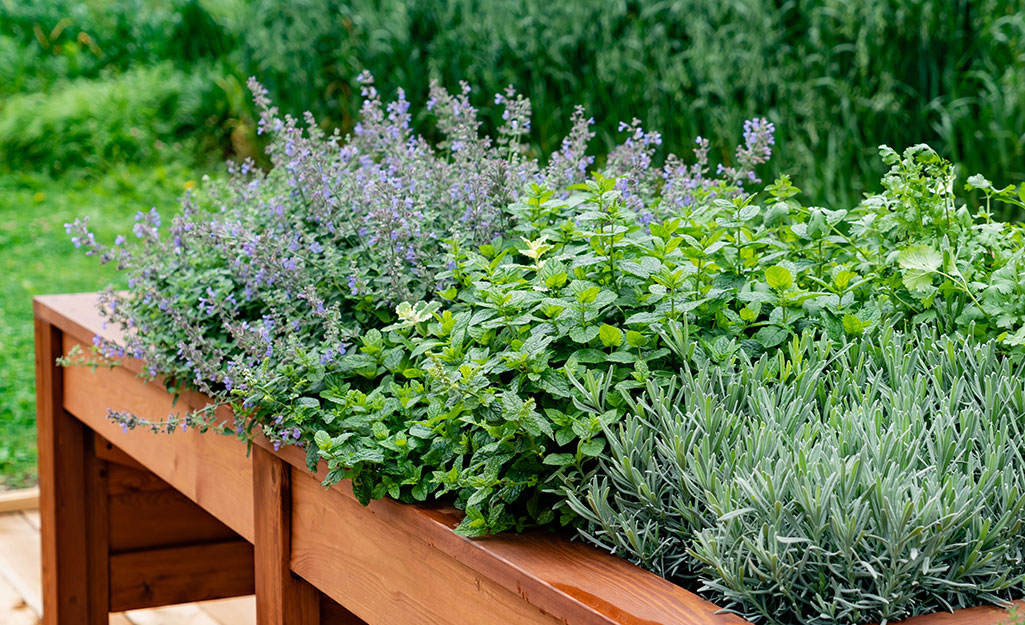To overwinter herbs, bring them indoors before the first frost and place them in a sunny window or under grow lights. Herbs can be successfully overwintered indoors by following these simple steps.
As the colder months approach and the threat of frost looms, it is important to take action to ensure the survival of your herb garden. By bringing your herbs inside and providing them with the right conditions, you can enjoy fresh herbs throughout the winter.
We will explore the steps you need to take to successfully overwinter your herbs, including selecting the right herbs to bring indoors, preparing them for their new environment, and providing them with proper care and maintenance. With a little effort, you can keep your herbs thriving even during the coldest months of the year.

Credit: www.homedepot.com
How to Overwinter Herbs: Step by Step Guide
Preparing Your Herbs For Winter
Preparing your herbs for winter involves evaluating their health, trimming and pruning them, and transplanting them to containers. To start, assess the overall condition of your herbs, looking for any signs of disease or pest infestation. Once identified, promptly remove and discard the affected plants.
Next, carefully trim and prune the remaining healthy herbs, cutting back any dead or damaged foliage. This not only improves the overall appearance of the plants, but also encourages healthy growth. As winter approaches, consider transplanting your herbs to containers.
This allows for easier positioning in protected areas or even indoors, where they can continue to thrive throughout the colder months. When selecting a potting mix for your containers, choose a well-draining option that provides the necessary nutrients for your herbs to thrive.
By following these steps, you can successfully overwinter your herbs and enjoy fresh flavors all year round.
Providing Optimal Winter Conditions
Providing optimal winter conditions for herbs involves determining the right location with controlled temperature and humidity. To overwinter herbs successfully, find a spot that shields them from harsh weather conditions. Maintain an area that offers enough sunlight but protects against strong winds.
Ensure that the temperature remains consistent and does not dip too low, as herbs are sensitive to frost. Create a microclimate by using mulch or straw to insulate the soil and retain heat. Shielding herbs from excessive moisture is key, as they can rot easily.
Consider using frost cloth or row covers for added protection. By providing an ideal winter environment, herbs can survive and thrive until spring arrives.
Ensuring Proper Care During Winter Months
Ensuring proper care for your herbs throughout the winter months is crucial. Watering should be done sparingly, as over-watering can lead to root rot. Maintain a balanced nutrient management plan to keep your herbs healthy and growing. Implement pest and disease prevention strategies to protect your herbs from potential threats.
Keep in mind that sunlight exposure is essential for the growth of your herbs, so ensure they receive enough light. Overall, with careful attention to watering, nutrients, pests, diseases, and sunlight, you can successfully overwinter your herbs.
Harvesting And Using Overwintered Herbs
Overwintered herbs are a delightful addition to your culinary endeavors. When the signs of readiness for harvest begin to show, it’s time to pick those fresh leaves for your dishes. Storing herbs properly ensures they retain their flavor and aroma for later use.
You can incorporate these overwintered herbs into a variety of recipes, adding a burst of freshness and depth to your meals. From soups and stews to salads and sauces, the possibilities are endless. Experiment with different combinations and flavors to elevate your cooking to new heights.
Don’t miss out on the chance to enjoy the benefits of overwintered herbs throughout the year. Start harvesting, storing, and incorporating these flavorful herbs into your recipes today.
Frequently Asked Questions On How To Overwinter Herbs
How Do I Overwinter Herbs Indoors?
To overwinter herbs indoors, bring potted herbs inside before the first frost. Trim them down, place in a sunny spot, and water sparingly throughout the winter. Avoid overwatering to prevent root rot. Prune regularly to maintain shape and remove any diseased leaves.
Can I Overwinter My Herbs In The Garden?
Depending on the herb type and hardiness zone, some herbs can be overwintered in the garden. Mulch them heavily to protect the roots from freezing temperatures. In areas with severe winters, it’s best to dig up the herbs, pot them, and bring them indoors.
What Is The Best Way To Overwinter Potted Herbs?
When overwintering potted herbs, find a cool, dark place where temperatures stay above freezing. This could be a garage, shed, or basement. Water sparingly, about once a month, to prevent the roots from drying out. Move them back outside in spring.
Should I Trim Herbs Before Overwintering?
Yes, it’s important to trim herbs before overwintering them. Prune the herbs, removing any dead or diseased leaves. This helps prevent pests and diseases from overwintering with your herbs. It also encourages new growth in the spring when the herbs are brought back outside.
Can I Overwinter Perennial Herbs Outdoors?
Perennial herbs, such as thyme, oregano, and rosemary, can be overwintered outdoors in mild climates. Mulch heavily around the base of the plants to protect the roots from freezing temperatures. Cover them with burlap or row covers for extra insulation.
Conclusion
Overwintering herbs can be a rewarding experience for any gardener. By following these simple guidelines, you can ensure the survival of your favorite herbs throughout the winter months. Remember to choose the right location, provide proper insulation, and adjust watering levels accordingly.
Taking steps to protect your herbs from extreme temperature fluctuations and harsh weather conditions will help promote their health and longevity. Whether you choose to bring them indoors, create a shelter, or cover with mulch, the key is to find the right approach for each individual herb.
With a little extra care and attention, you can enjoy fresh herbs throughout the year and continue to add flavor and fragrance to your culinary creations. Happy gardening!

